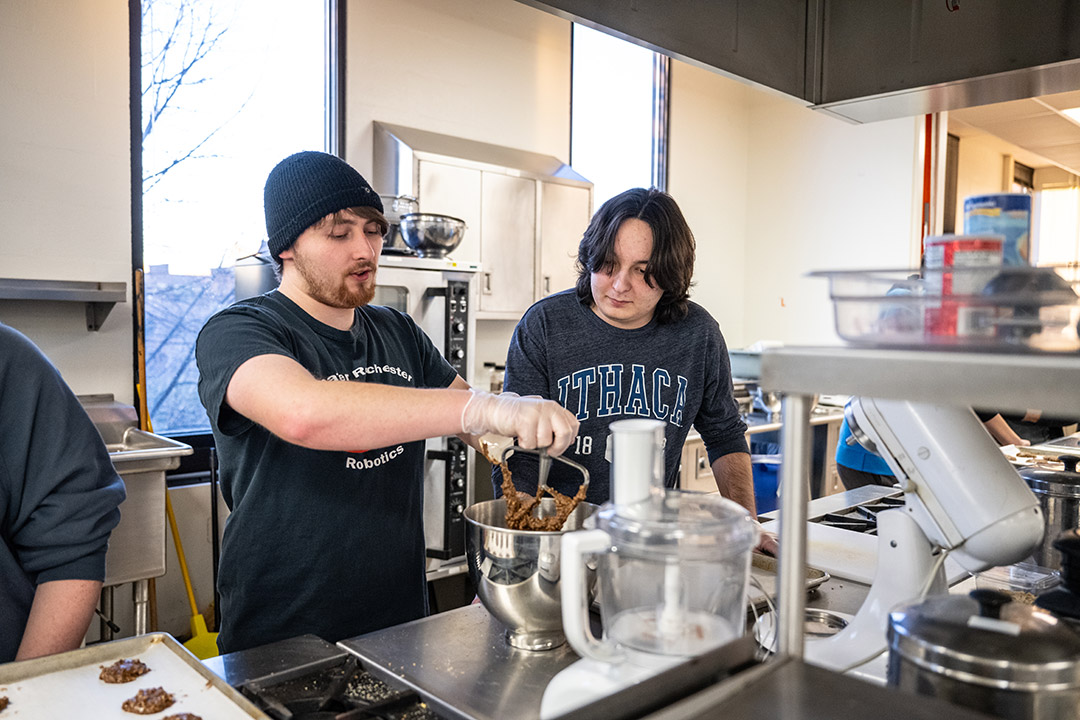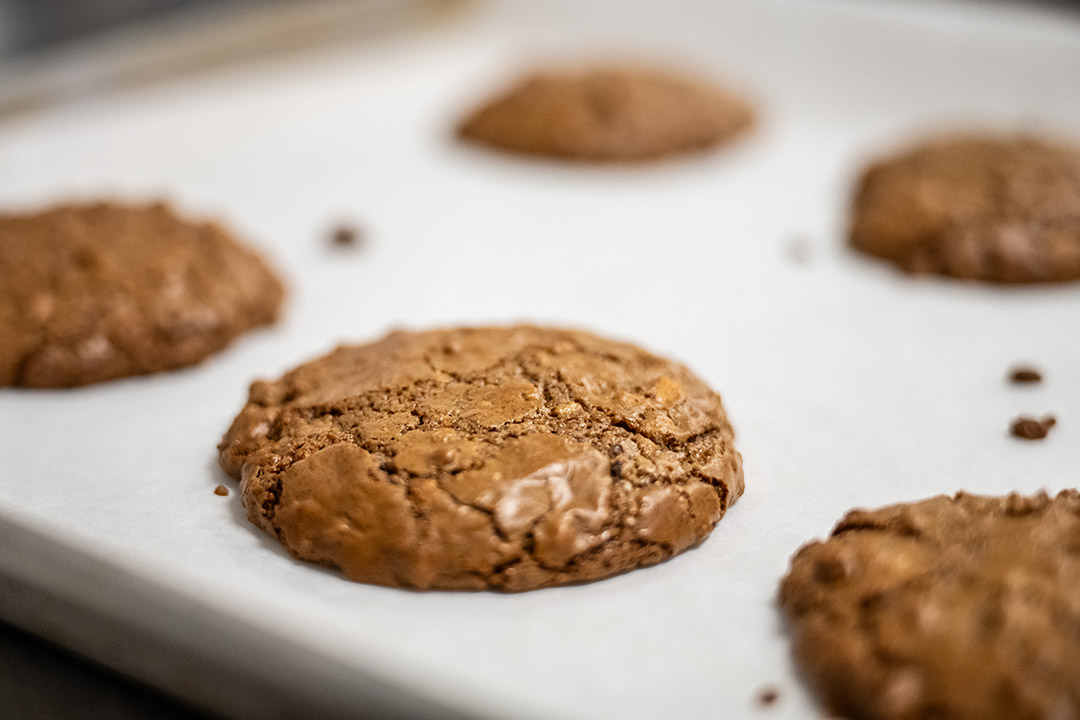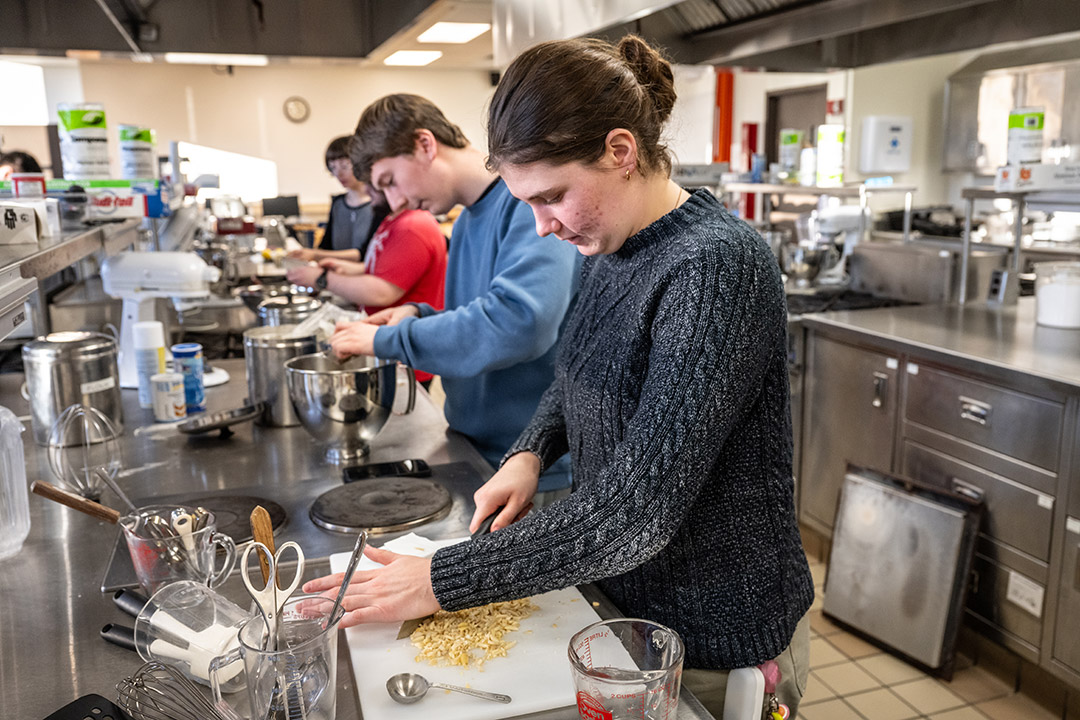RIT students explore RIT Archives for ‘Hands on History’ class
Traci Westcott/RIT
RIT students Chris Kurdziel and Jack Waters make German chocolate cookies during a class exploring the 19th century domestic-science program offered by the Mechanics Institute.
A history class that dug into the RIT Archives allowed students like criminal justice major Chris Kurdziel to sample the cutting-edge domestic science curriculum taught in 1893 at the Mechanics Institute, a forerunner to RIT.
During the class, Hands on History: Examining RIT’s Domestic Science and Arts Program, Kurdziel learned to embroider the letter “C,” sew, and bake cookies and buns from period cookbooks held in the RIT Archives and shared from a classmate’s personal collection.
Traci Westcott/RIT
Students enrolled in the class, Hands on History: Examining RIT’s Domestic Science and Arts Program, made gingersnaps, buns, and these German chocolate cookies.
“It’s not very often that a history class is hands on, but I read that in the name and I thought I’d give it a try and it’s actually really fun,” said Kurdziel, a fourth-year student from Rochester who is completing a history immersion.
The domestic science movement in the 19th century focused on teaching women the necessary skill sets of the time. Nearly 370 women enrolled in domestic science classes at the Mechanics Institute during the first year of the program in 1893-1894. Mechanics Institute founder and Rochester businessman Henry Lomb supported the domestic science program, and many of the first students were employees from Bausch and Lomb Co.
Instructor and university archivist Elizabeth Call designed the entire class with a hands-on approach without delving into lessons on laundry, mending, home nursing, and other subjects of “physical culture.” Instead, students deciphered and transcribed the 1893 class ledger, written in elaborate cursive handwriting, and located the women’s residences on a historical Rochester map. Then, they had to conduct research. Students’ individual research projects focused on the lives of women from the program within the historical context.
“The majority of the women lived in the city, some lived further out—Henrietta or Irondequoit,” Call said. “It’s tricky because the plat map is overlaid on a contemporary map. It can get a little fuzzy if a street doesn’t exist anymore. Then, students needed to go into the historical map to figure it out.”
Her students used Ancestry.com and other historical databases to dig for information about the students from the ledger. They looked at census data, birth and death notices, Rochester Democrat and Chronicle archives, and other historical records.
The domestic science classes drew together women from different socioeconomic backgrounds, and finding personal information about the women was unpredictable. Some students discovered little more than names and addresses, while others found unexpected details.
Traci Westcott/RIT
RIT students Milena Kahan, a criminal justice major from Davis, Calif., and Liam Conroe, a journalism major from Jamestown, N.Y., follow a recipe from Kahan’s vintage Fannie Farmer cookbook.
Milena Kahan, a criminal justice major from Davis, Calif., transcribed several names of working women who left barely a trace of their life. “I have a lot of girls who were really young and they were coming from Bausch and Lomb, and it was hard to follow them because they got married.”
The wife of a successful shoe company, W.B. Eastwood and Sons, attended a class at the Mechanics Institute, said Morgan Woodard, a third-year museum studies major from Grant, Mich.
“I was reading through different newspaper articles and it was showing events she did for the community,” Woodard said. “It showed an event she did for Kodak. It was really cool to see how sociable she was, and how in the community she was.”
Thomas Nguyen, a fifth-year Japanese major, discovered unexpected details from the ledger of the sewing class roster.
“I found out that one of them was Chinese,” Nguyen said. “They moved here, so I’m assuming they came from a wealthy family. Another thing I realized when I was in the database archives is that there was a common popularity of Chinese people in Rochester.”
Criminal justice major Kurdziel tracked down a former Mechanics Institute student who set aside domestic science for a life of crime. Newspaper accounts about the woman’s legal troubles gave Kurdziel a trail to follow. “Lizzy Kohlmeier moved to Iowa later in life and became a bootlegger and was involved in organized crime during the Prohibition era. She was arrested in 1920 in Iowa.”
Another name Kurdziel investigated from the class ledger revealed a student with a different career path. According to census data, Canadian-born Maude McCall immigrated to Rochester in 1885 and rose through the ranks at the local telephone company.
“Maude M. McCall had her entire career outside of domestic science despite having an education in it,” Kurdziel said. “She worked all the way from operator to superintendent at the telephone company until she died.”
Students from the Hands on History class will host a domestic-science fair, “The Athenaeum Games,” from 3:30 to 4:45 p.m. Dec. 7 in the RIT Archives, located on the third floor of Wallace Library. Participants can win prizes by playing Tiger Transcribe-a-thon, Gizmo Bingo, Fact or Fiction, and the Kentucky Salad Bar. The Athenaeum Games is free and open to the public.






